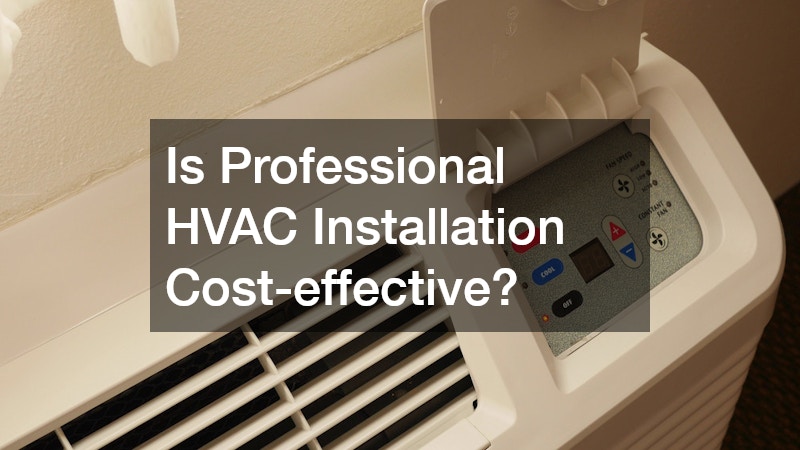Why HVAC Installation Should Be Left to Professionals
Understanding why it’s essential to rely on professional expertise for HVAC installation is crucial in ensuring safety, efficiency, and long-term functionality. In this article, we will delve into the core reasons why hiring a qualified professional is the best choice for HVAC systems.
What are the Risks of DIY HVAC Installation?
Potential Hazards
DIY HVAC installation involves numerous safety hazards, including risks posed by electricity and chemical coolants. Without the knowledge of a professional, individuals may inadvertently cause harm to themselves or damage the equipment.
Improper handling of electrical components can lead to dangerous situations such as short circuits or fire hazards. The lack of experience in managing these risks underscores the importance of employing a qualified technician.
Moreover, incorrect handling of refrigerants can result in harmful exposure, with prior incidents highlighting the potential for severe health repercussions. The danger inherent in these substances reinforces the necessity for professional handling to ensure safety.
Compromised Performance
Incorrect installation of HVAC systems can lead to compromised performance, significantly impacting energy efficiency. This inefficiency causes the system to work harder, translating to increased energy bills.
Poorly installed systems often circulate inadequate air volumes, reducing indoor air quality. The resulting discomfort in home environments showcases why professional installation is critical to achieving optimal performance.
Moreover, frequent mechanical failures due to improper setup can lead to costly repairs. Such issues largely stem from a lack of technical expertise during DIY installations.
How Does Professional Installation Ensure Safety?
Compliance with Regulations
Professionals adhere to strict regulatory compliance, ensuring that all installations meet current building codes and safety standards. This adherence not only guarantees the safety of the household but also protects homeowners from potential legal issues.
Regulatory compliance also extends to environmental safety standards, ensuring that HVAC systems are installed without detrimental environmental effects. This level of oversight is typically beyond the scope of most DIY installations.
In instances where standards are not met, insurance policies may become invalid. This further emphasizes the need for professional installation, as engaging a certified technician guarantees compliance.
Proper Tools and Equipment
HVAC professionals utilize specialized tools and equipment that facilitate safe and accurate installations. These tools are often complex and are designed specifically for various HVAC components.
Without access to such tools, DIYers might be unable to complete all aspects of an installation proficiently. The professional-grade equipment also contributes to ensuring that the unit operates effectively and efficiently.
Engaging professional services ensures the installation procedure benefits from the highest levels of precision. This precision is vital for the longevity and effectiveness of HVAC systems.
Can Professional Installation Improve System Efficiency?
Precise Sizing and Placement
A critical element of HVAC installation is choosing the right-sized unit that fits the specific needs of a home. Specialists are adept at calculating the correct sizing, ensuring maximum efficiency and performance.
Incorrect sizing can lead to systems that are either overworked or underutilized, drastically impairing function and energy use. For instance, an oversized unit will cycle on and off too frequently, creating higher wear and tear over time.
Professional technicians also consider the best placement to optimize airflow and functionality. This attention to detail is key to achieving the desired comfort levels in indoor environments.
Advanced Calibration Techniques
Advanced calibration techniques are implemented by professionals to fine-tune systems for optimal performance. Calibration is a sophisticated procedure that ensures each part of the HVAC system is operating cohesively.
Without proper calibration, even the most advanced systems may not function as intended. This can result in uneven heating or cooling and higher energy costs.
The precision involved in these calibration techniques ensures that the HVAC system is not just installed, but optimized for efficiency and effectiveness. This meticulous attention to detail is fundamental to achieving and maintaining peak performance.
What are the Long-Term Benefits of Hiring a Professional?
Enhanced Longevity
Professional installations contribute significantly to the extended lifespan of HVAC systems. Proper setup ensures components work in harmony, reducing the likelihood of breakdowns.
Routine maintenance, also often carried out by professionals, plays a crucial role in system longevity. Such upkeep can prevent small issues from escalating into major repairs or replacements.
The investment in professional installation thus offers substantial returns through prolonged system life and reduced total cost of ownership. It is a safeguard against future inconveniences and costs.
Warranty Protection
Most HVAC systems come with a manufacturer’s warranty that mandates professional installation to remain valid. This warranty acts as a protective shield by covering the cost of certain repairs and replacements.
DIY installations usually void these warranties, leaving homeowners to bear the entire cost of potential system failures. Hiring a professional ensures that warranties provide the full scope of coverage intended by the manufacturer.
The security provided by a warranty can provide peace of mind and financial protection if something goes wrong with the system. This alone justifies the need for expert service when installing HVAC systems.
Is Professional HVAC Installation Cost-effective?
Reduction in Future Repair Costs
Engaging experts can lead to substantial savings in future repair costs by minimizing the risk of early malfunctions. A professionally installed system is less susceptible to breakdowns, saving on costly repairs.
The intricate knowledge professionals possess allows them to identify potential trouble spots before they develop into significant problems. This preventive approach ensures that unforeseen costs are kept to a minimum.
In this light, professional installation should be viewed as a strategic investment in the system’s reliability and the homeowner’s financial health.
Energy Efficiency Savings
Expertly installed systems operate with greater efficiency, providing noticeable savings on energy bills. A professionally calibrated and correctly sized system makes efficient use of energy, reducing consumption and costs.
The benefits extend beyond lower utility bills; increased energy efficiency also reduces the ecological footprint of the household. This dual advantage underscores the broader impact of professional HVAC installation.
In today’s environmentally conscious world, responsible energy use is more relevant than ever.

